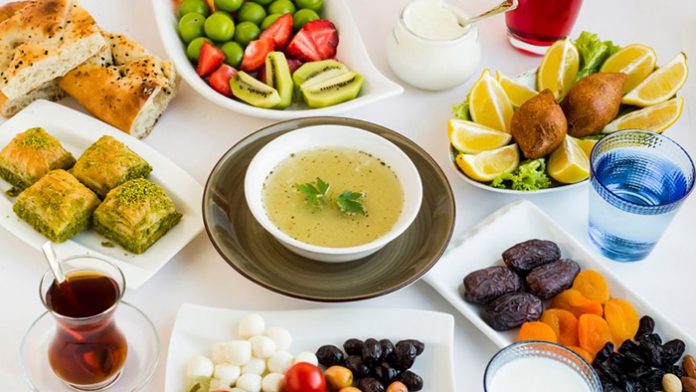Fasting in Ramadan is considered to be good for the body, as it provides some health benefits such as aiding in detoxification, cleaning out your digestive system, and enhancing heart health by improving blood pressure, triglycerides and cholesterol levels.
However, the concept of Ramadan and healthy fasting during this month seems to be misunderstood by some people. They make the mistake of binging on food from the minute they break fast until it is time to stop. This is the reason they feel abdominal discomfort, constipation and weight gain.
Overeating at certain times after fasting for a long periods can cause headache, indigestion, acid reflux and lack of sleep as well. How can we avoid such problems and eat properly during this month? We need to start with by being careful about the food we consume.
As we are fasting for more than 8 hours, our body needs slow-digesting foods containing fiber, and vegetables. You should also consider avoiding fast-digesting foods like juices, white bread, sweets, and sugary drinks, which has the tendency to make you feel hungry again after 2 to 3 hours of eating. There is also the issue of fried foods having been linked to causing heartburn, indigestion and weight gain.
Many people wonder, ‘Why do we tend to gain weight easily during the month of Ramadan, even when our food quantities are still as same as before?’
When we are fasting for more than 8 hours, our metabolism slows down. As a result, introducing food after these 8 fasting hours makes us gain weight easily. So imagine when we eat big quantities at one shot! Our body is no longer burning enough calories, our metabolism is very low and subsequently, we tend to gain a lot of weight!
Here are some tips to break fast to avoid all the problems mentioned before.
Start with:
- 1/2 cup of low-fat yogurt and two dates. Dates contain iron, magnesium, potassium, which is perfect to handle dehydration.
- Two glasses of water ( Do not forget that you haven not drunk water for hours, so you need fluids)
- One small plate of fattouche or green salad.
- One small bowl of broth or non-creamy soup. These items contain essential and enough vitamins and minerals to compensate for the fluid loss and dehydration.
- These food choices are long-digesting food, which keep you satiated for a longer time. Now that you understand what you need to do for the first food part, finish your prayers, then exercise or rest for a bit.
After an hour:
- Eat a plate of these main food items: Tachriba, hariss, jerish, steamed rice and lean steak, chicken or fish.
- You can have a piece of sweet, but limit it to twice a week. However, your health will benefit more if you take a piece of fruit or a fruit salad, which is rich in fiber and vitamins.
For souhour:
- Do not let your main dish be your souhour as this meal is usually taken very late. Hence, your metabolism is even slower than before.
- You have to take light food on souhour, particularly food that does not make you feel thirsty the next day. For example, a small plate of steamed rice and yogurt. Rice retains water in the body, so you do not you feel thirsty, get energy, and you feel full for a longer time. Yogurt is also refreshing, and the best choice is low-sodium yogurt. Avoid salty food because it will make you feel thirsty the next day.
- Avoid juices as these are simple sugars, easily absorbed in the body, and will not make you feel satisfied.
- Avoid tea and coffee at night. These are diuretics, and will flush the water out of your body, causing you to feel dehydrated. In addition, their caffeine content will give you sleeping problems.
- A fruit platter is another good option for when you need to prevent dehydration. Other good options are a bowl of foul mudammas, especially topped with fresh tomatoes, or baked potatoes doused with low- fat labne with the addition of cucumbers and fresh lettuce.
And, of course, do not forget to drink a lot of water to compensate for the fluid loss.
To subscribe to my diet programs, don’t forget to log in to: www.eatlikemira.com


















